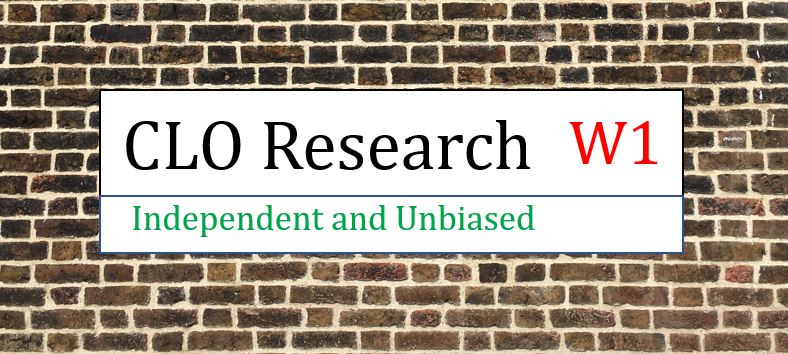The underlying modeled collateral spreads are crucial for equity investors, as these modeled spreads are key in determining the issue price of CLO equity tranches. If a deal reports a significantly lower first reported collateral spread, the original attractiveness of the equity investment at a certain price may change as a result.
These historical post-RP prepayment rates for each manager could potentially be useful as cash flow modeling inputs. The average prepayment rates for 105 managers are 20.0%, 33.7%, and 29.9% for the first, second, and third year post-RP, respectively.
US CLO Managers: Varying Prepayment Rates in the Post-Reinvestment Period
Managers who have proactively restructured their deals whenever opportunities arose are generally viewed favourably. Certain managers have access to internal or external equity capital, enabling them to execute a reset or even upsize a deal. To implement a reset, some seasoned deals may require additional equity capital to support a new, long-dated structure, while other better-performing deals may do so without any equity injection or even the class X tranche. In a sample of 138 deals from 2014 that were fully redeemed, those that were reset outperformed those that were only refinanced by approximately 6 percentage points in terms of median equity IRRs.
A manager’s performance and MVOC played a much more significant role in determining reset BB tranche pricing. BB pricing ranged from 540 bps to 770 bps among larger managers with over $11.5 billion in BSL CLO AUM.
US BSL CLOs: Thoughts on Recent Resets
As reported by Pitchbook LCD, BlackRock has revealed that it is considering the redemption of the BlackRock European CLO I. This deal was initially priced in February 2016 and later reset to a €474 million deal in February 2018, extending its reinvestment end date to 15 June 2022. This deal has performed well, with its final IRR expected to exceed 12%, net of incentive fees, assuming a par issue price.
A sample of 492 EU CLO deals (vintage 2013–2023) is included in this study. Deals with a collateral pool factor below 65% are excluded. Market Value Over-Collateralization (MVOC), for instance, at the BB tranche level, is calculated by dividing the collateral market value (MV) by the sum of CLO liabilities (AAA to BB). MVOC is a crucial point-in-time metric for pricing CLO-rated tranches, closely monitored by primary and secondary market participants. EU CLO managers who have done well in terms of MVOC (BB) metric across their deals include Redding Ridge Asset Management, Bridgepoint Credit Management, and Sound Point Capital Management.
EU CLO Managers: Rankings Based on MVOC (BB)
A sample of 1,601 US BSL CLO deals (vintage 2013–2023) is included in this study. Deals with a collateral pool factor below 60% are excluded. US CLO managers who have done well in terms of MVOC (BB) metric across their deals include Golub Capital, Oak Hill Advisors, New York Life, Birch Grove, and Sixth Street.
US BSL CLO Managers: Rankings Based on MVOC (BB)
The recent reset of Birch Grove CLO 2 has been accretive, reducing the weighted average cost of capital (WACC) by an impressive 29 bps. Furthermore , the reinvestment period of this deal has been extended by three years, following its original issuance on September 13, 2021.
Resets can add substantial value for both debt and equity investors. From the debt perspective, it is comparable to experiencing a large prepayment event, where all debt tranches are prepaid at par. Holders of out-of-the-money fixed-rate tranches, or lower mezzanine tranches with below-average MVOCs, would particularly welcome receiving par and may seek to redeploy the proceeds into more attractive opportunities. A number of deals actually increased their WACC upon reset. For instance, several deals that were reset late last year or during the first half of this year saw their WACC increase, but equity investors still found it worthwhile to do a reset due to the added reinvestment period and flexibility.
Please refer to the table in this Basic Premium article for a list of managers and the number of resets conducted on their seasoned BSL CLO deals from 2013 to 2021. Notably, CIFC, Oak Hill, CSAM, Elmwood, Octagon, Generate, NB, and Onex have performed particularly well in resetting their seasoned deals.
Resets: Seasoned Managers Who Have Done Well
The resent reset of Jubilee CLO 2019-XXII must have brought much jubilation to various stakeholders, particularly the holders of fixed-rate notes. Both the EUR 14.5 million class B2 (Aa1-rated) and EUR 10 million class C2 (A1-rated) had low fixed-rate coupons of 2.4% and 3.1%, respectively. With the reset, these notes were prepaid at par, a great result for these investors.
A sample of 28 EU CLO deals redeemed in 2024 to date is used for this study.
As shown in the table in this Basic Premium article, across all issuance years, the median IRRs of EU CLO equity tranches were higher than their corresponding median BB tranches. However, BB tranches tend to exhibit a more stable IRR profile and demonstrated better IRR performance at the 25th percentile for deals from 2015, 2016, 2017, 2018, and 2022.
Redeemed in 2024: EU CLO BB Tranche IRRs vs. Equity IRRs
Disclaimers
The information, research, data, research-related opinions, observations, and estimates contained in this document have been compiled or arrived at by CLO Research Group, based upon sources believed to be reliable and accurate, and in good faith, but in each case without further investigation. None of CLO Research Group or its service providers; authorised personnel, or their directors make any expressed or implied presentation or warranty, nor do any of such persons accept any responsibility or liability as to the accuracy, timeliness, completeness, or correctness of such sources and the information, research, data, research related opinions, observations and estimates contained in this document. All information, research, data, research-related opinions, observations, and estimates in this document are in draft form as of the date of this document and remain subject to change and amendment without notice. Neither CLO Research Group nor any of their third-party providers shall be subject to any damages or liability for any errors, omissions, incompleteness, or incorrectness of this document. This article is not and should not be construed as an offer, or a solicitation of an offer, to buy or sell securities and shall not be relied upon as a promise or representation regarding the historical or current position or performance of any of the deals or issues mentioned in it.














